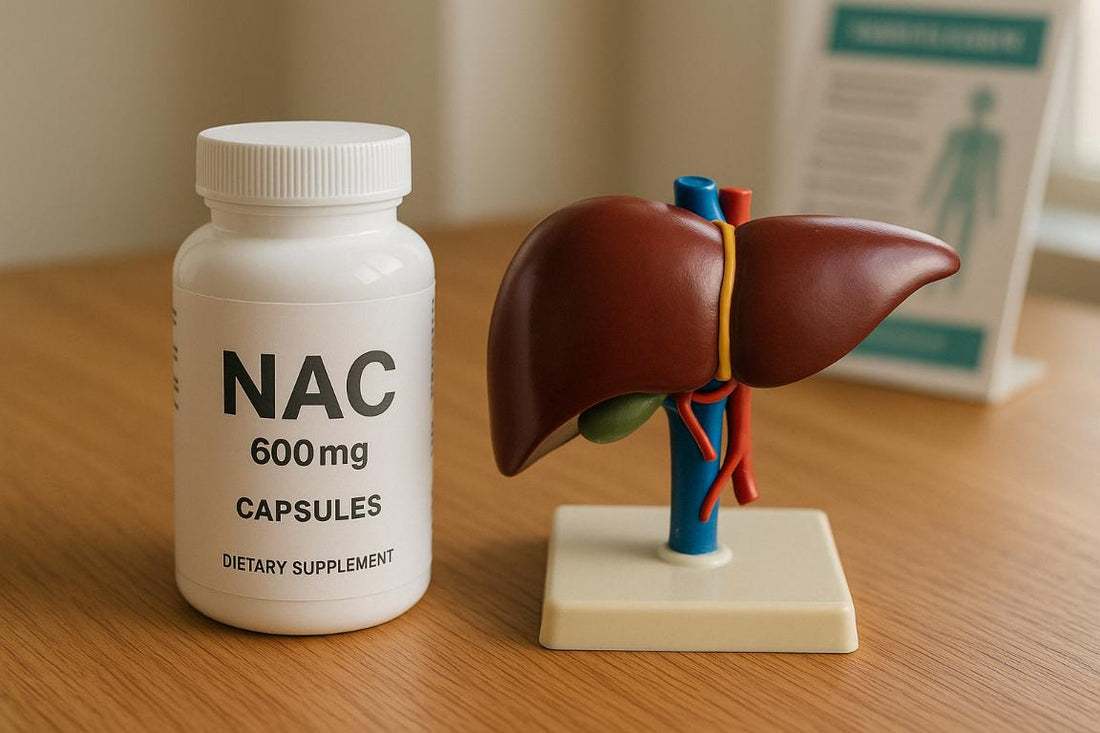NAC Liver Support: An Overview
 Written By
Yusela Aquino
Written By
Yusela Aquino

N-Acetylcysteine (NAC) is a precursor to glutathione, the body's main antioxidant. NAC offers potential benefits in enhancing detoxification pathways and mitigating oxidative stress. This overview delves into the mechanisms by which NAC may support liver function and its applications in various hepatic conditions.
Understanding NAC and Its Role in Liver Detoxification
NAC is a derivative of the amino acid cysteine and serves as a precursor to glutathione. Glutathione plays a pivotal role in the liver's detoxification processes, particularly in Phase I and Phase II reactions. Phase I detoxification involves the transformation of lipophilic toxins into more reactive intermediates, while Phase II conjugation reactions render these intermediates water-soluble for excretion. By replenishing glutathione levels, NAC supports these detoxification pathways, aiding in the neutralization and elimination of toxins.
Clinical Applications of NAC in Liver Conditions
Non-Alcoholic Fatty Liver Disease (NAFLD)
NAFLD is characterized by the accumulation of fat in hepatocytes, leading to inflammation and potential progression to non-alcoholic steatohepatitis (NASH). Oxidative stress and insulin resistance are key contributors to NAFLD pathogenesis. NAC's antioxidant properties may help reduce oxidative damage and improve insulin sensitivity, thereby addressing underlying mechanisms of NAFLD.
Elevated Liver Enzymes
Elevations in liver enzymes such as alanine aminotransferase (ALT) and aspartate aminotransferase (AST) indicate hepatocellular injury. NAC supplementation has been associated with reductions in these enzymes, suggesting hepatoprotective effects. By mitigating oxidative stress and supporting cellular repair, NAC may aid in normalizing liver enzyme levels.
Liver Fibrosis and Cirrhosis
In chronic liver diseases, ongoing inflammation and oxidative stress contribute to fibrosis and cirrhosis. While NAC cannot reverse established fibrosis, its antioxidant effects may slow disease progression by reducing hepatic stellate cell activation and collagen deposition. Clinical studies have explored NAC's role in attenuating fibrosis markers and improving liver function parameters.
Dosage and Administration

The appropriate dosage of NAC varies based on individual needs and clinical context. For general liver support, doses ranging from 600 mg to 1,200 mg per day are commonly used. In specific clinical scenarios, higher doses may be warranted under medical supervision. NAC is available in various forms, including capsules, powders, and effervescent tablets. It's advisable to start with a lower dose to assess tolerance, as gastrointestinal discomfort can occur in some individuals.
Selecting a Quality NAC Supplement
When choosing an NAC supplement, consider the following:
- Purity and Potency: Opt for products that are third-party tested to ensure quality.
- Formulation: Some supplements combine NAC with other hepatoprotective agents like milk thistle (silymarin) or alpha-lipoic acid, which may offer synergistic benefits.
- Manufacturing Standards: Select products manufactured in facilities that adhere to Good Manufacturing Practices (GMP).
NAC in Combination with Other Liver Supportive Nutrients
Combining NAC with other antioxidants and hepatoprotective compounds may enhance liver support:
- Glutathione: While oral glutathione has limited bioavailability, NAC serves as a precursor, promoting endogenous synthesis.
- Milk Thistle (Silymarin): Known for its antioxidant and anti-inflammatory properties, milk thistle may complement NAC's effects on liver health.
- Alpha-Lipoic Acid: This antioxidant regenerates other antioxidants, including glutathione, and may work synergistically with NAC.
Takeaway

NAC offers a multifaceted approach to supporting liver health through its role in glutathione synthesis and antioxidant defense. Its applications span various liver conditions, from NAFLD to alcohol-induced liver injury. Incorporating NAC into a comprehensive liver support regimen, alongside lifestyle modifications and other supportive nutrients, may enhance hepatic function and resilience. As always, it's essential to consult with a healthcare provider to determine the most appropriate approach for individual health needs.
Check Your Liver Health from Home—Easily and Accurately
Wondering about your liver health? Skip the clinic lines and take control with an at-home liver test kit from Ribbon Checkup. It's fast, simple, and gives you reliable results using just a urine sample—all from the comfort of your home. Whether you're managing a liver condition or just staying on top of your wellness, Ribbon makes it easy to get the answers you need.
Written by Yusela Aquino
Yusela is a medical student with a degree in Biology and a strong foundation in health communication. With experience in both research and clinical settings, she writes clear, evidence-informed content to help patients and caregivers better understand liver health, chronic disease, and transplant care.
Related resources
- Best Supplements for Fatty Liver
- Liver Reduction Diet
- Fatty Liver Diet Plan PDF: A Doctor-Recommended 7-Day Meal Guide to Reverse Fatty Liver Naturally
References
Baumgardner, J. N., Shankar, K., Hennings, L., Albano, E., Badger, T. M., & Ronis, M. J. (2008). N-Acetylcysteine attenuates progression of liver pathology in a rat model of nonalcoholic steatohepatitis3. Journal of Nutrition, 138(10), 1872–1879. https://doi.org/10.1093/jn/138.10.1872
El-Serafi, I., Remberger, M., El-Serafi, A., Benkessou, F., Zheng, W., Martell, E., Ljungman, P., Mattsson, J., & Hassan, M. (2018). The effect of N-acetyl-l-cysteine (NAC) on liver toxicity and clinical outcome after hematopoietic stem cell transplantation. Scientific Reports, 8(1). https://doi.org/10.1038/s41598-018-26033-z
Hodges, R. E., & Minich, D. M. (2015). Modulation of Metabolic Detoxification Pathways Using Foods and Food-Derived Components: A Scientific Review with Clinical Application. Journal of Nutrition and Metabolism, 2015, 1–23. https://doi.org/10.1155/2015/760689
Kim, K., Rhim, T., Choi, I., & Kim, S. (2001). N-Acetylcysteine Induces Cell Cycle Arrest in Hepatic Stellate Cells through Its Reducing Activity. Journal of Biological Chemistry, 276(44), 40591–40598. https://doi.org/10.1074/jbc.m100975200
N-ACETYL CYSTEINE (NAC): overview, uses, side effects, precautions, interactions, dosing and reviews. (n.d.). https://www.webmd.com/vitamins/ai/ingredientmono-1018/n-acetyl-cysteine-nac
PubChem. (n.d.). Acetylcysteine. PubChem. https://pubchem.ncbi.nlm.nih.gov/compound/Acetylcysteine

Yusela is a medical student with a degree in Biology and a strong foundation in health communication. With experience in both research and clinical settings, she writes clear, evidence-informed content to help patients and caregivers better understand liver health, chronic disease, and transplant care.



